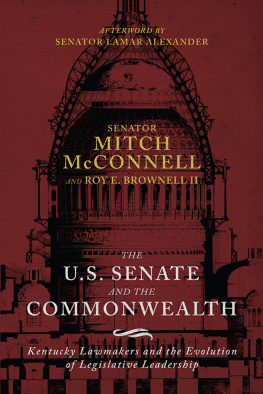
Defending the Filibuster

DEFENDING the FILIBUSTER
THE SOUL OF THE SENATE
REVISED AND UPDATED EDITION
Richard A. Arenberg and Robert B. Dove
FOREWORD BY
SENATOR OLYMPIA SNOWE
INDIANA UNIVERSITY PRESS
Bloomington and Indianapolis
This book is a publication of
Indiana University Press
Office of Scholarly Publishing
Herman B Wells Library 350
1320 E. 10th Street
Bloomington, IN 474053907
iupress.indiana.edu
Telephone orders | 800-842-6796 |
Fax orders | 812-855-7931 |
2015 by Richard A. Arenberg and Robert B. Dove
First edition published in 2012
All rights reserved
No part of this book may be reproduced or utilized in any form or by any means, electronic or mechanical, including photocopying and recording, or by any information storage and retrieval system, without permission in writing from the publisher. The Association of American University Presses Resolution on Permissions constitutes the only exception to this prohibition.
 The paper used in this publication meets the minimum requirements of the American National Standard for Information SciencesPermanence of Paper for Printed Library Materials, ANSI Z39.481992.
The paper used in this publication meets the minimum requirements of the American National Standard for Information SciencesPermanence of Paper for Printed Library Materials, ANSI Z39.481992.
Manufactured in the United States of America
Cataloging information is available from the Library of Congress.
ISBN 978-0-253-01627-0 (paperback)
ISBN 978-0-253-01631-7 (ebook)
1 2 3 4 521 20 19 18 17 16
TO BERNIE ARENBERG
(19222011)
No president or Red Sox manager ever quite met his standards
CONTENTS
 by Senator Olympia Snowe
by Senator Olympia Snowe




FOREWORD
Senator Olympia Snowe
The late former U.S. Senate majority and minority leader Robert Byrd (D-WV) was an expert in Senate procedure. In his words the Senate is the one place in the whole government where the minority is guaranteed a public airing of its views, and a place for open and free debate and for the protection of political minorities. That principle is why this book is so important.
I well recall in 2005 that the Senate had been plagued for a number of years with a partisan dispute over the confirmation of judicial nominees and, in particular, a minority of senators systematic blocking of final roll-call votes on several nominees by refusing to end debate, otherwise known as the filibuster. As a consequence, the Republican majority was seeking to break the logjam by exercising the so-called nuclear option, which would have jettisoned long-standing rules requiring 60 votes to end a filibuster. The Senates standing rules, voluntarily imposed and long respected, stated that votes of more than a mere simple majority are required for amendment of the basic rules by which it operates. However, the minoritys action would have been implemented with a simple majority vote, counter to Senate tradition and contravening the manifest spirit of time-honored standing Senate rules. In response, 14 of us in the Senate7 Republicans and 7 Democratsshared a deep concern that such an action would undermine the rights of the minority party in the institution. That 60-vote threshold had always been a bulwark protecting the rights of the minority.
After extensive discussions, and just as the Senate was about to cross this political Rubicon, the Gang of 14, as we were labeled, forged a pact based on mutual trust. We would support a filibuster of judicial nominees only under what we labeled extraordinary circumstances, and we would oppose the nuclear option, in an agreement that embodied the very manifestation of the power of consensus building.
Indeed, forcing compromise, coalitions, and bipartisan support for legislation and executive nominees is the foundational purpose behind the concept of the 60-vote threshold to halt a filibuster, reflecting the unique character of the Senate. As illuminated in Federalist #62, the intention of the Founding Fathers was that senators would (or at least should) be less subject to the infection of violent passions, or to the danger of combining in pursuit of unjust measures. Therefore, a minority power such as the filibusteravailable as it has been to Republicans and Democrats alikeshould be said to exemplify the Senates better tradition of commitment to compromise and statesmanship among the chambers majority and minority parties, whatever their division may be at any given point in time. And when the U.S. Senate is asked to govern a closely divided electorate, as it is now, it has a special responsibility to preserve this check and balance.
Defending the Filibuster: The Soul of the Senate is a fascinating and essential examination of the role of the filibuster and why it is integral to the functioning of the Senate as the Founders intendedand as it ought to be. Richard Arenberg and Robert Dove bring their depth and breadth of experience on the front lines of Senate procedures and legislation to this important defense of the filibuster as a vital tool in ensuring that the electorate, however divided, may be responsibly represented.
That is why, when after the 2012 election there was discussion about the majority introducing a new rule to eliminate the filibuster by a simple majority voteagain, the nuclear optionI stated in my final speech on the floor of the Senate that as the body contemplated changes, it should return to the template of the Gang of 14 and exercise a similar level of caution and balance. Instead, I urged, they should begin a collaborative process to address the issue. Because what makes the Senate uniquewhat situates the institution better than any other to secure the continued greatness of our nationis that balance between accommodation of the minority and primacy of the majority. And in January 2013 the Senate did avoid another nuclear option when it reached at least a temporary agreement on filibusters. Regrettably, however, that accord did not endure. In November 2013 the Senate majority deployed the nuclear option, changing filibuster rules for the presidents nominees on a simple majority vote after the minority party blocked up-or-down votes on three of the presidents selections.
It is true that neither side in the process exercised the better course of moderation that the Senate requires in order to forge responsible and timely consensus on major challenges. But the whole rationale for such instruments as the filibuster is to ensure that a consensus indicative of something more than mere partisan divide is reached on essential matters. And the obvious principle that this purpose serves has greater, not lesser, application at times when a politically polarized nation faces difficult problems requiring effective resolution.
In this light the timeliness of the release of this revised and updated version of Defending the Filibuster couldnt be more critical, coinciding with the convening of a new Senate. This book should give serious pause to those who might entertain the notion of continuing down the path of irrevocably altering the basic function of the Senate, and strong impetus for reversing the deployment of the nuclear option. To suggest that the filibuster should be eliminated because it is misused would be akin to recommending that automobiles should be summarily removed from our roadways because they have the potential to be injurious. Rather, what is required in the Senate is a change in behavior to ensure that political overreaching as a product of hyper-partisanship does not become the new norm.
Next page











 The paper used in this publication meets the minimum requirements of the American National Standard for Information SciencesPermanence of Paper for Printed Library Materials, ANSI Z39.481992.
The paper used in this publication meets the minimum requirements of the American National Standard for Information SciencesPermanence of Paper for Printed Library Materials, ANSI Z39.481992. by Senator Olympia Snowe
by Senator Olympia Snowe